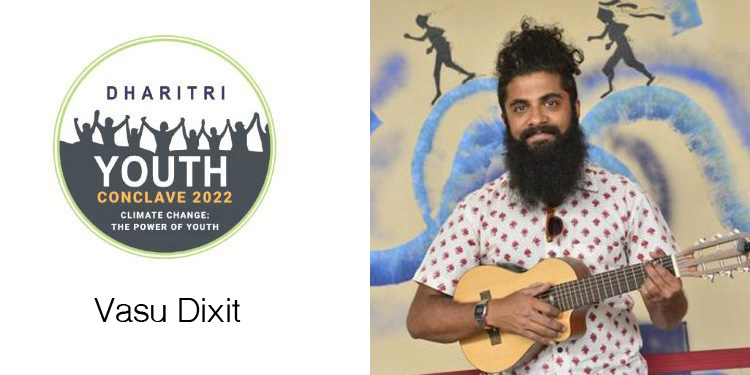Vasu Dixit, a young musician from Karnataka, has used his craft to draw attention to the crucial contribution of the Bangalore waste pickers towards the protection of environment. Dixit will attend ‘Dharitri Youth Conclave 2022 on Climate Change: The Power of Youth’ to be held in Bhubaneswar, November 24 as a performer and speaker.
Vasu Dixit is a composer and a musician. Known for being the lead singer of the folk-rock band Swarathma, he also creates music of his own through the Vasu Dixit Collective (VDC). Vasu’s specialty lies in bringing together in his songs the nuances of musical art. His open-throated voice, rich vocal style, wide range, and deep passion for his craft are driven by a free-spirited celebration of life, when he is performing solo or with the band.
Versatile as he is, Vasu has worked as an actor and a film director predominantly in the Kannada film industry. But what keeps the singer in the limelight is the social consciousness that is inherent to his songs. Dixit recently released ‘Happy Number’, a song highlighting the contribution of waste pickers often stigmatised in society for their work. The ‘Happy Number’ in Vasu’s song refers to the 3,83,250 tonne of waste that the waste pickers of Bangalore facilitate diverting from the landfills, by collecting and recycling plastics and other waste materials generated in the city. The effort of these waste pickers is of significance as waste accumulation in landfills has immense negative environmental impact, contributing to air, water and soil pollution. Vasu says, “As citizens, we have a responsibility towards the informal waste pickers of Bangalore.
To treat them with respect and the dignity they deserve for protecting our environment. The Happy Number song was a great opportunity for me to celebrate them and their work.” To support and celebrate the traditional folk music of the country, he recently started the PaDa Project, with a vision to bring meaning and create relevance for folk music in present times. The PaDa Project is conceptualised and will be produced and implemented by Vasu himself. Vasu, who finds total freedom in folk music, as an artist and a singer, says he owes a large part of his inspiration to become a musician to the folk tradition. He believes, “It’s highly essential for the times we live in to reconnect with folk music, because of their simplicity, universal themes, and stories filled with philosophy and humanity.” The most complex philosophies of life are sung in the simplest way possible in these songs and that drives Vasu to explore more folk musicians and music in India.
Through the project, Vasu hopes to embark on a journey of reconnecting with folk traditions and find new inspiration. Vasu says the focus of the project will be on collaborating with young folk musicians. The younger generations will feel inspired to carry forward the knowledge of folk traditions passed on to them. The larger intent of the project is to create livelihood opportunities for the younger generations of folk musicians, and build around these knowledge systems, contextualising folk music in the present times, he adds.

